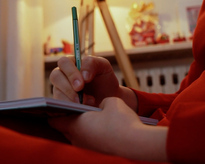Sophie Y

Sophie took part in a randomised controlled trial to assess the value of an intervention for use by diabetes clinicians to help young people self-manage their diabetes and other long term health conditions. Sophie enjoyed taking part in the trial and would consider other similar trials in the future.
Sophie aged 12 is White British and lives at home with her parents and siblings. She attends a local school and enjoys Art and cleaning her bedroom. Sophie was diagnosed with Type I diabetes at the age of 3 years.
More about me...
Sophie aged 12 is White British and lives at home with her parents and siblings. She attends a local school and enjoys Art and cleaning her bedroom. Sophie was diagnosed with Type I diabetes at the age of 3 years. Sophie aged 12, lives with her parents and siblings at home. She attends a local school and enjoys Art and cleaning her bedroom. Sophie was diagnosed with Type I diabetes at the age of 3 years. Type I diabetes is the third most common chronic disease. Recently Sophie took part in a randomised controlled trial to assess the value of an intervention led by diabetes clinicians to help young people self-manage their diabetes and other long term health conditions.
Sophie talks about her experience and how much she enjoyed taking part. She doesn’t remember receiving any information because her parents had all the information and is unsure about the name of the trial or how long the trial is for. She thinks they were trying to understand about how young people feel about their condition. Sophie remembers attending the hospital for one day with other young people aged 11 to 18 years who had diabetes and some had other conditions such as attention and hyperactive disorder and epilepsy. Sometimes they worked together as a group and sometimes they were split into smaller groups depending on the condition they had.
She says she learned about diabetes and different foods, how to control blood sugar levels, hygiene and safety in medicines. Sophie also had to complete a questionnaire. She says this was ‘dead easy’ to complete and mainly involved tick boxes. The questions included things such as how you feel about having diabetes and is there anything that you don’t understand about diabetes. There were lots of games and activities too. Sophie enjoyed being with similar others and would like to do something similar again.
Sophie is unsure what happens next or when the trial ends.
Sophie (aged 12) was randomised to take part in a one day trial to develop an intervention for use by diabetes clinicians. Taking part in the trial was really fun and they had lots of nice healthy food.
Sophie (aged 12) was randomised to take part in a one day trial to develop an intervention for use by diabetes clinicians. Taking part in the trial was really fun and they had lots of nice healthy food.
Sophie says being in a trial is fun and has taught her more about the condition.
Sophie says being in a trial is fun and has taught her more about the condition.
So why do you think you, you, taking part in a trial, what would be your key reason for taking part? What would be your motivation?
Because it was, it was like not like school. It was like fun in a way. And it like, it taught like us like what, what to learn, what to do with our condition.
Attending a one day group intervention was a great experience for Sophie. She enjoyed being with other young people with diabetes and other long term health conditions.
Attending a one day group intervention was a great experience for Sophie. She enjoyed being with other young people with diabetes and other long term health conditions.
Meeting other young people with diabetes and sharing experiences was really beneficial to Sophie. The intervention involved doing lots of group activities and completing a questionnaire.
Meeting other young people with diabetes and sharing experiences was really beneficial to Sophie. The intervention involved doing lots of group activities and completing a questionnaire.
Sophie feels that keeping children and young people engaged throughout the day is important when attending a self-management intervention.
Sophie feels that keeping children and young people engaged throughout the day is important when attending a self-management intervention.

